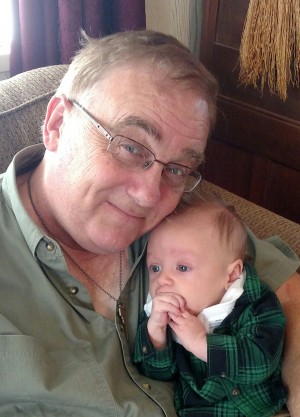I love you, Lord; you are my strength. (Psalm 18:1)
 Last time we looked at the nature of God and how He loved us—like a Father. We also camped on those three little words: I Love You, and how we shouldn’t hesitate saying them, because it may be too late and the privilege of bringing reconciliation or hope or joy or belonging (and a myriad of other accompanying characteristics with love) is lost.
Last time we looked at the nature of God and how He loved us—like a Father. We also camped on those three little words: I Love You, and how we shouldn’t hesitate saying them, because it may be too late and the privilege of bringing reconciliation or hope or joy or belonging (and a myriad of other accompanying characteristics with love) is lost.
But I think that the silence and hesitation of saying “I love you” may be very natural. Why do I say that? Do you know how many times someone in the Bible says to the LORD “I love you?” ONCE. UNO. In all of Scripture, only one, single, solitary time does someone say to the LORD, “I love You.” And you know who it is right? It’s gotta be David right? A man after God’s own heart (1 Samuel 13:14); and if he knew God’s heart, then he knew that God would love to hear “I love you” from His child. And so the verse at the top of the page is from Psalm 18:1. The first thing out of David’s mouth in this song, in this prayer is: “I love you LORD.”
One of the first theological tenets that is learned by every kid in Sunday School is: God is love. The whole verse goes: We know how much God loves us, and we have put our trust in his love. God is love, and all who live in love live in God, and God lives in them. (1 John 4:16) Don’t you think that a God who IS love, would want to hear that He is loved? And yet all we can muster up in the Bible is one time?
Now there is a time in the New Testament where words “I love you” appears, but it’s kinda coaxed:
After breakfast Jesus asked Simon Peter, “Simon son of John, do you love me more than these?” “Yes, Lord,” Peter replied, “you know I love you.” “Then feed my lambs,” Jesus told him. Jesus repeated the question: “Simon son of John, do you love me?” “Yes, Lord,” Peter said, “you know I love you.” “Then take care of my sheep,” Jesus said. A third time he asked him, “Simon son of John, do you love me?” Peter was hurt that Jesus asked the question a third time. He said, “Lord, you know everything. You know that I love you.” Jesus said, “Then feed my sheep. (John 21:15-17)
Now Peter is not hurt by the fact Christ asked him the question three times. It has to do with his level of commitment, and you discover that, when you look up the Greek word for love. The first two times Christ asks: Do you agape love me? And twice Peter responds, “You know I phileo love you.”
The J.B. Phillips translation reveals the nuance that is missed in most other English translations: When they had finished breakfast Jesus said to Simon Peter, “Simon, son of John, do you love me more than these others?” “Yes, Lord,” he replied, “you know that I am your friend.” “Then feed my lambs,” returned Jesus. Then he said for the second time, “Simon, son of John, do you love me?” “Yes, Lord,” returned Peter. “You know that I am your friend.” “Then care for my sheep,” replied Jesus. Then for the third time, Jesus spoke to him and said, “Simon, son of John, are you my friend?” Peter was deeply hurt because Jesus’ third question to him was “Are you my friend?”, and he said, “Lord, you know everything. You know that I am your friend!” “Then feed my sheep,” Jesus said to him.
In the end, Peter appeals to Christ’s omniscience, and Christ knowing that Peter was not there—yet—Jesus still gives him his assignment. And that should speak volumes to all of us. There are times and places and people when we cannot summon enough love, but Christ still calls us to serve.
Back to David. Although Psalm 119 has no author mentioned, people much smarter than I seem to think this is indeed a Psalm of David. That being said, there are 5 verses in this Psalm which fall into the “Close Call’ category.
 O how I love Your law! It is my meditation all the day. (v. 97)
O how I love Your law! It is my meditation all the day. (v. 97)
I hate those who are double-minded, but I love Your law. (v. 113)
You have removed all the wicked of the earth like dross; therefore I love Your testimonies. (v. 119)
Therefore I love Your commandments above gold, yes, above fine gold. (v. 127)
Consider how I love Your precepts; revive me, O LORD, according to Your lovingkindness. (v. 159)
The psalmist tells us that he loves God’s law, testimonies, commandments, and precepts. You could just say that he loves God law. That aligns itself clearly with what Christ tells us in John 14:15 – If you love me, you will keep my commandments. That’s what love does—it not only speaks love, it lives love in a life of obedience. And that’s what keeps you and me from falling into the “Talk is Cheap” trap. It’s not just saying that we love Him, it shows that we love Him.
One other Psalm:
I love the LORD, because He hears my voice and my supplications. (Psalm 116:1)
Here we find the Psalmist not talking to the Lord, but talking about the Lord. Do you? Do you tell others that you love the Lord? The are watching, and they might just listen.
So, if “I love you LORD” is not in your vocabulary, may I suggest to take a page from King David and begin your prayers with “I love you Lord.” Love be doing, by being obedient. And tell someone about it; that you love the LORD. It will radically change your life, and the lives of those you love.

 The earliest childhood memory I have with my Dad was laying on his chest, as he sat in his recliner, with both of us eating out of a can of peanuts, watching Rassling (long before it became so dramatic and overproduced). I still remember his arms wrapped around me.
The earliest childhood memory I have with my Dad was laying on his chest, as he sat in his recliner, with both of us eating out of a can of peanuts, watching Rassling (long before it became so dramatic and overproduced). I still remember his arms wrapped around me. kids you love them today? They need to hear it; and they need to see it and feel it. And for you Dads, loving your kids is going to give them a great glimpse into the love of their Heavenly Father.
kids you love them today? They need to hear it; and they need to see it and feel it. And for you Dads, loving your kids is going to give them a great glimpse into the love of their Heavenly Father. It’s a beautiful, warm Saturday morning, and the soccer fields are jammed with little kids swarming around a soccer ball trying to make headway—one way or another. Surrounding the field are the onlookers: parents, family, friends; yelling and jumping, waving and screaming, urging the tide to turn toward one goal or the other.
It’s a beautiful, warm Saturday morning, and the soccer fields are jammed with little kids swarming around a soccer ball trying to make headway—one way or another. Surrounding the field are the onlookers: parents, family, friends; yelling and jumping, waving and screaming, urging the tide to turn toward one goal or the other.
 We all want our kids to be great, but that means loving them, and living out before them the character of Christ. Things like gentleness and humility are not typically sought out, but consider there two passages:
We all want our kids to be great, but that means loving them, and living out before them the character of Christ. Things like gentleness and humility are not typically sought out, but consider there two passages: Of course being humble and gentle like Christ is going to have more that an impact on your kids. It will change your life.
Of course being humble and gentle like Christ is going to have more that an impact on your kids. It will change your life.